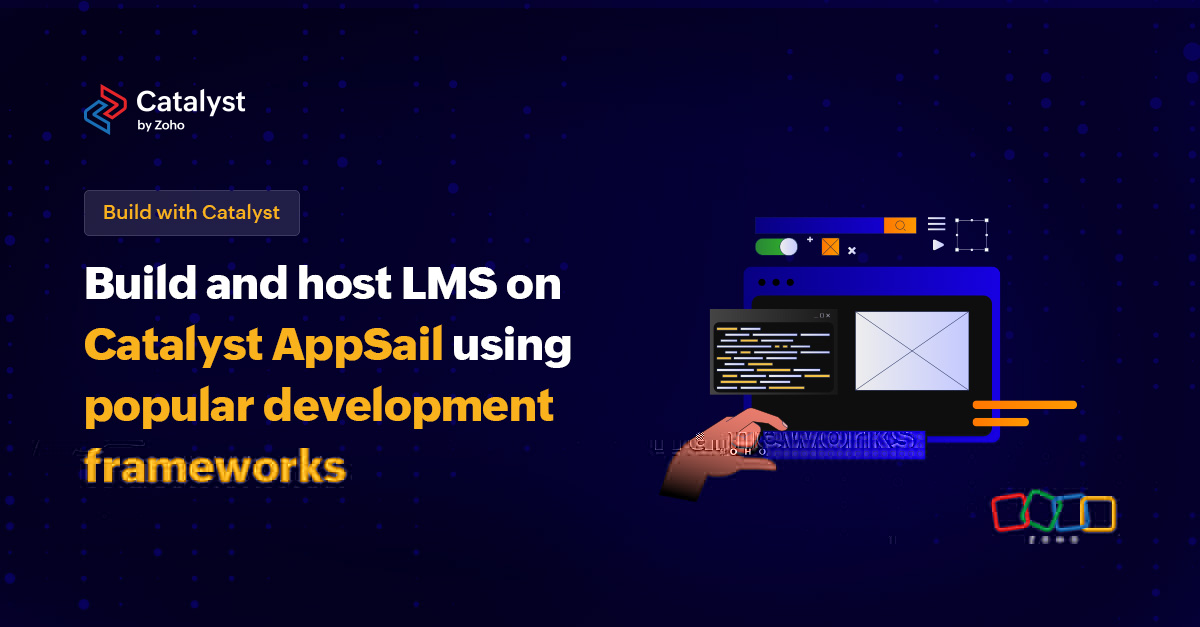- HOME
- Build with Catalyst: Build and host LMS on Catalyst AppSail using popular development frameworks
Build with Catalyst: Build and host LMS on Catalyst AppSail using popular development frameworks
- Last Updated : October 10, 2023
- 520 Views
- 2 Min Read

We are back with yet another interesting use case where we dig in to building a highly-scalable, learning management system (LMS) for an e-learning solution using popular frameworks in Catalyst
What is Catalyst AppSail?
AppSail is a highly-scalable platform-as-a-service (PaaS) that facilitates building and hosting powerful applications using popular frameworks in Java, Python, and Node.js.
Catalyst AppSail supports:
- Python frameworks like Django, Flask, CherryPy, Bottle, Falcon, Pyramid, Tornado, and more.
- Java frameworks like SpringBoot, SpringMVC, Jetty, Struts, Vaadin, and more.
- Node.js frameworks like Express, HAPI, Koa, Restify, and more.
For Java applications, you can either deploy a Java WAR application or a Java SE application to AppSail. If you have an application in Node.js or Python, you can directly deploy them using the Catalyst CLI.
Kickstart your e-learning startup on Catalyst AppSail
Let's say your customer wants to build an LMS focused on custom e-learning solutions for their startup. With minimal staff, crossing the development hurdle is a big challenge with questions like finding a cloud platform to build web apps and mobile apps, hosting the e-learning solution, managing the live traffic, platform scalability, and many more.
We are here to help bridge these development hurdles using Catalyst AppSail, a highly-scalable, fully-managed platform where we provide and manage infrastructure, operating systems, application runtime, and other dependencies, thereby helping focus on the business logic. The Java developers can quickly start building an LMS in any IDE using the Java framework of their choice, without any Catalyst dependencies.
If there is a need for a database and other associated components, directly import the WAR file to Catalyst and continue building the same application coupled with Catalyst-specific components. The following Catalyst components are available to build a LMS module:
- Catalyst Data Store: A cloud-based relational database management system to store information related to the course, study materials, handouts, assignments, and more.
- Catalyst Cache: Temporary storage or caching service used to query temporary data faster.
- Catalyst File Store: A file object storage that can store certifications, e-books, and any file resources.
- Catalyst Logs: View detailed execution logs to troubleshoot the LMS and perform root cause analysis.
- Cron: Schedule to conduct and evaluate online examinations weekly, monthly, or quarterly within the LMS.
The best part, if the development team is well-versed in Python or Node.js, the same LMS can be built using popular frameworks in Python or Node.js. This way, the team can code the app in their favourite language, and we'll help host and deploy it to be accessed by the world.
We'd love to hear about your journey with Catalyst AppSail. Put on your creative hat, and share possible use cases with AppSail. Feel free to share your thoughts in the comments section or drop us a line for a detailed 1:1 session to help you get started.